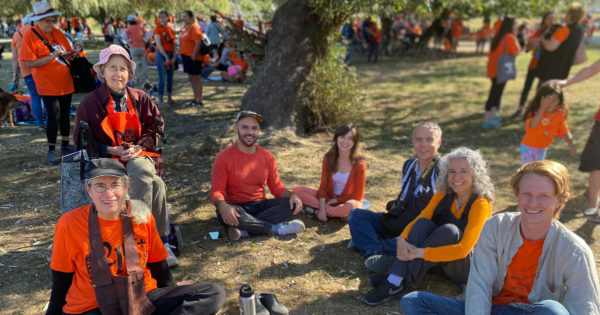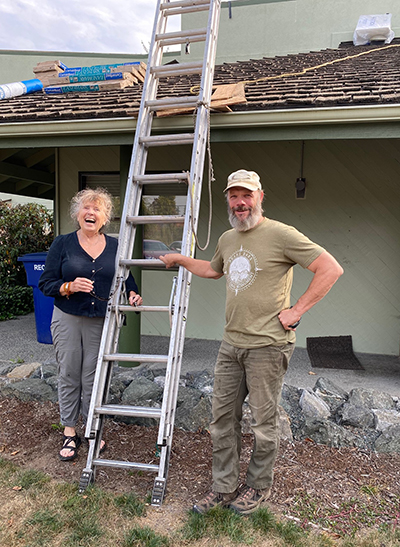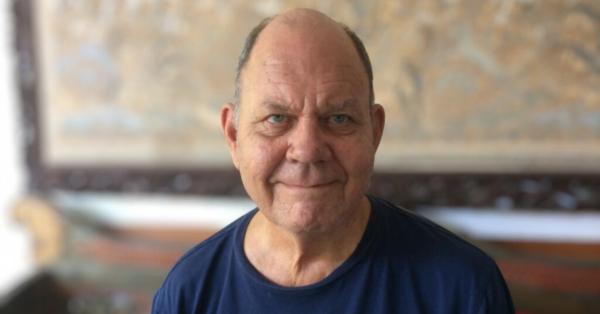
Mountain Rain Zen Community sangha members gather at an Orange Shirt Day event
By Tova Green
After visits with dharma friends in Eugene and Portland and a rest day in Portland, I drove to Bellingham, WA, a long stretch on Rt. 5 with many big-rig trucks. I made it a practice to stop and get out of my car at least every two hours to stretch, walk around, and have a snack.
Bellingham is the home of Red Cedar Zen Community, founded in 1991 as the Bellingham Zen Practice Group by Norman Fischer of Everyday Zen. In 2017 Norman invited Nomon Tim Burnett to be the guiding teacher. Red Cedar Zen Community joined Branching Streams in 2021 and I was eager to meet the teachers and sangha.

New home of Red Cedar Zen Community
My hosts in Bellingham (who were members of Red Cedar) and I went together to the Thursday evening practice and a Dharma talk given by Tim. During the pandemic, Red Cedar gave up their rented meeting place. They now rent a large space in the Bellingham Unitarian Fellowship. The Ino was very friendly and gave instruction when it was time for kinhin, as there were several newcomers. At the end of the evening those of us in the church were able to greet online participants on a screen.
During the pandemic Red Cedar Zen Center launched a capital campaign to buy a building and succeeded in doing so. They had an open house in August, although the building will need to be renovated before they can practice in it.
On my return journey from Vancouver I stopped in Bellingham to have lunch with Tim, Tanto Chris Burkhart, and sangha member Hannah Sullivan. I learned about the challenges, similar to those at the Arcata and Ashland centers, of bringing members back to the zendo after such a lengthy time of meeting on Zoom. Hannah and I went to see the building that will be Red Cedar’s future home. Roofers and electricians were at work. Sangha member Bob Penny, who is both an architect and a contractor, showed us how the building, which has been an office building, will be reconfigured.
I arrived in Vancouver the morning of the Canadian National Holiday, Truth and Reconciliation Day, formerly Indigenous People’s Day. This year the day was also called Orange Shirt Day, to remember the First Nation children who had died in boarding schools. I met Kate McCandless, who is co-guiding teacher with her husband Michael Newton, at the site of Mountain Rain Zen Community, a storefront space they rent from an indigenous women’s non-profit. Kate was wearing a vivid orange t-shirt with the words “Every Child Matters.” We headed to a park to attend a rally and meet sangha members there. As we approached the park, people wearing orange t-shirts were streaming toward it from all directions. Sangha members were found as we stood and listened to First Nation speakers and drummers, and saw dancers on a raised stage.
Kate and Michael live about an hour’s drive east of the city of Vancouver with a zendo in the basement of their home and a large garden in back. Kate and I led a daylong Zen and poetry workshop attended by eleven sangha members who drove out from the city. The day included meditation, listening to poems participants brought with them, writing outdoors, working with writing prompts, and listening to one another’s poems in a closing circle. Michael was Tenzo for the day and made a nourishing soup for lunch.
Sunday was a practice day at the Vancouver location, with zazen, service, and a dharma talk by Kate on the theme of the Fall Practice Period, the Vimalakirti Sutra. At lunch I met with members of the Social Action Committee, and then sat in on a Council (board) meeting that was in-person with a few Council members participating by Zoom. Many in leadership roles, including the Ino, Council Chair, and Treasurer are young (from my perspective) and have been practicing at Mountain Rain for several years.
I had a personal day in Vancouver and visited my cello teacher, who moved from the Bay Area to Vancouver last summer. On my last evening with Kate and Michael, I attended an online meeting of the Engaged Buddhist Practice Group. They were planning to show the film “Fracking the Peace.” ZenYU, a practice group for those in their twenties and thirties, was also meeting that night.
On my way back to San Francisco I spent about 24 hours at Great Vow Zen Monastery. I had met founding teachers Chozen and Hogen Bays on the Jizos for Peace pilgrimage to Hiroshima and Nagasaki in 2005 and have wanted to visit them ever since. Great Vow is in the Maezumi Roshi White Plum lineage. I participated in zazen, service, work practice, and an oryoki breakfast. Chozen walked with me through the Jizo garden in a forest where moss clings to the trees and the heads of some of the Jizo statues. The residential sangha was warm and friendly.
I drove home along the Oregon Coast, stopping to follow a trail to a 500-year-old Sitka Spruce and walk on a sandy beach, with the nearby lighthouse hidden in dense fog.
I am reflecting on what I learned and am grateful for this opportunity to share the rich experience with the wider sangha.











